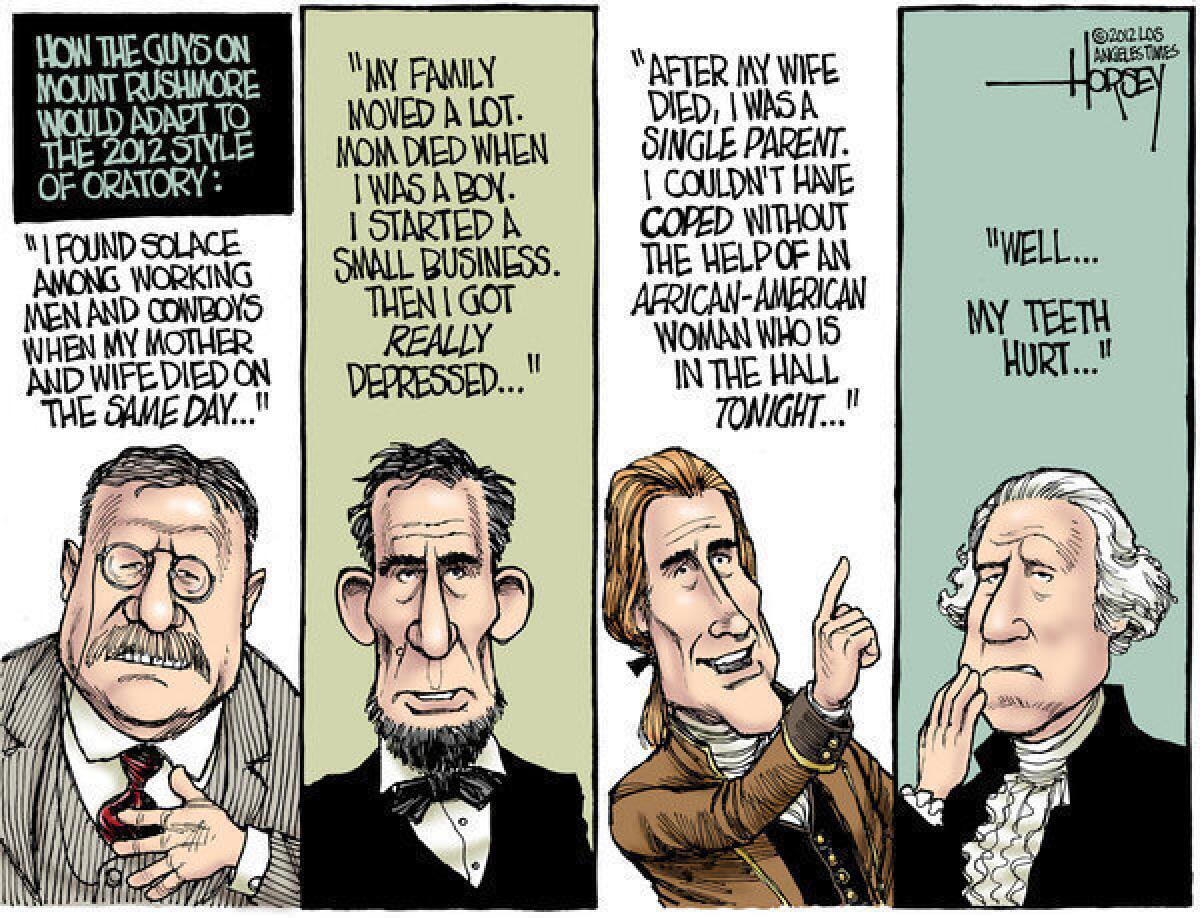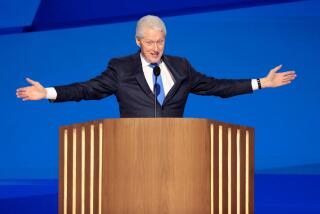Romney and Obama forced to get personal at party conventions

No one expected Franklin Delano Roosevelt to show his wheelchair to the nation and pepper his speeches with details about his battle with polio. No campaign strategist ever thought to have Pat Nixon come onstage to talk about the homey details of her married life with Dick. When Dwight Eisenhower was nominated, no one thought to testify to his qualities as a father and husband; what mattered was that he beat the Germans at Normandy.
At 2012’s national political party conventions, though, self-revelation was a requirement. It was as if the candidates, their wives and many of the supporting speakers were guests of Oprah or (reaching way back to early TV) contestants on “Queen for a Day.”
This imperative to get personal was due, in part, to the unusually private natures of the men at the top in both parties. Mitt Romney, in particular, needed to get beyond the not-inaccurate caricature of him as a stiff rich guy who will say anything or take any convenient position to get elected. And so, his wife, Ann, was given the prime spot on the first night of the convention to tell how much fun her guy was on their first date, reminisce about the makeshift furniture they had in their student apartment and recall how splendid Mitt was with their five bratty boys.
Strange as it seems, President Obama also needed reintroduction. Even after four years as president, a lot of people cannot see past his cool demeanor while a frighteningly large share of the electorate imagines him born and raised in some Kenyan village under the tutelage of scheming Third World socialists.
So, First Lady Michelle Obama filled the Ann Romney role with a spectacular speech that drew a poignant picture of her own childhood in a modest bungalow in Chicago, raised by a crippled father who went to work every day to have enough money to help send his kids to college. She noted that her husband had it even harder, raised by a single mother who sometimes had to resort to food stamps. As Ann did regarding Mitt, Michelle detailed her dating life with Barack, right down to the rusted out holes in the doors of his car.
Both Obama and Vice President Joe Biden began their acceptance speeches with romantic tributes to their wives. Romney, too, made part of his speech a love note to Ann and much of the rest of it a testament to his mom and dad. Interestingly, there was less biography about Paul Ryan, the least known of the four contenders. Yes, he mentioned his days as a teenager flipping burgers at a fast-food joint and praised his mom’s valiant effort to get a college degree after his father died, but Ryan did not speak of his infatuation with the libertarian writings of Ayn Rand and avoided the fact that he has spent his entire adult life working in Washington, D.C.
Brothers, sisters and sons were marshaled to say what super people the Obamas and the Romneys are. Regular folk with heartfelt stories gave testament to Romney’s good works as a Mormon bishop. And most of the speakers who stepped up to the microphone seemed to have their own story to tell about a hardscrabble childhood, a working-class dad, a saintly mom and immigrant grandparents seeking the American dream.
All this biographical speechifying is a contemporary iteration of the way so many 19thcentury presidential candidates claimed to have risen from humble roots -- even if those roots were planted in a sprawling antebellum mansion with slave quarters nearby. A great deal was made of Abraham Lincoln’s birth in a log cabin; much less about his years as an affluent attorney in the Illinois state capital.
Twenty-first century America is a society that craves intimate details about celebrities while common citizens share personal facts freely on Facebook and Twitter. It is no surprise that the handlers of our presidential candidates seek to win advantage by feeding that public fascination. There is nothing wrong with this, unless biography overshadows serious discussion of policy.
Sure, Theodore Roosevelt could have talked about his sickly childhood, his bad eyesight and the tragic deaths of his mother and first wife on the same day, but he had far too many bigger ideas he wanted to explain to voters from his bully pulpit. Lincoln could have shared the pain of fellow sufferers of clinical depression, but he was more concerned about the thousands who suffered under slavery.
It is swell that Mitt Romney and Barack Obama are good family men with exemplary mothers. But, after watching two weeks of speeches in Tampa, Fla., and Charlotte, N.C., we may know more about how they wooed their wives than how they plan to fix the economy.
More to Read
Get the L.A. Times Politics newsletter
Deeply reported insights into legislation, politics and policy from Sacramento, Washington and beyond. In your inbox three times per week.
You may occasionally receive promotional content from the Los Angeles Times.











